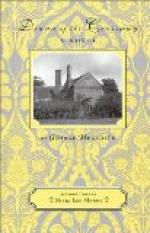There stood the house. Absolutely empty! thought Redworth. The sound of the gate-bell he rang was like an echo to him. The gate was unlocked. He felt a return of his queer churchyard sensation when walking up the garden-path, in the shadow of the house. Here she was born: here her father died: and this was the station of her dreams, as a girl at school near London and in Paris. Her heart was here. He looked at the windows facing the Downs with dead eyes. The vivid idea of her was a phantom presence, and cold, assuring him that the bodily Diana was absent. Had Lady Dunstane guessed rightly, he might perhaps have been of service!
Anticipating the blank silence, he rang the house-bell. It seemed to set wagging a weariful tongue in a corpse. The bell did its duty to the last note, and one thin revival stroke, for a finish, as in days when it responded livingly to the guest. He pulled, and had the reply, just the same, with the faint terminal touch, resembling exactly a ‘There!’ at the close of a voluble delivery in the negative. Absolutely empty. He pulled and pulled. The bell wagged, wagged. This had been a house of a witty host, a merry girl, junketting guests; a house of hilarious thunders, lightnings of fun and fancy. Death never seemed more voiceful than in that wagging of the bell.
For conscience’ sake, as became a trusty emissary, he walked round to the back of the house, to verify the total emptiness. His apprehensive despondency had said that it was absolutely empty, but upon consideration he supposed the house must have some guardian: likely enough, an old gardener and his wife, lost in deafness double-shotted by sleep! There was no sign of them. The night air waxed sensibly crisper. He thumped the backdoors. Blank hollowness retorted on the blow. He banged and kicked. The violent altercation with wood and wall lasted several minutes, ending as it had begun.
Flesh may worry, but is sure to be worsted in such an argument.
’Well, my dear lady !’—Redworth addressed Lady Dunstane aloud, while driving his hands into his pockets for warmth—’we’ve done what we could. The next best thing is to go to bed and see what morning brings us.’
The temptation to glance at the wild divinings of dreamy-witted women from the point of view of the practical man, was aided by the intense frigidity of the atmosphere in leading him to criticize a sex not much used to the exercise of brains. ‘And they hate railways!’ He associated them, in the matter of intelligence, with Andrew Hedger and Company. They sank to the level of the temperature in his esteem—as regarded their intellects. He approved their warmth of heart. The nipping of the victim’s toes and finger-tips testified powerfully to that.




